|
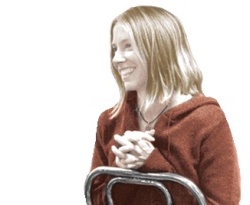
Boston Beats: Please state your
name, age, and occupation for the record please.
...
Rachel McCartney: Rachel McCartney, Iím 34. Occupation: Musician?
Traveler? Student? Iím a student in nursing.
BB: How did you first get into
music?
...
RM: When I was eight years old I started classical guitar, although I
hesitate to tell people that because they expect me to be a much better
guitar player than I am. But that was just my beginning.
BB: When did you write your first
song?
...
RM: I was sixteen when I wrote my first song, when my dog Iza died. I did
a lot of music in high school, musicals, and I was in Jazz Band, singing.
Throughout high school Iíd sneak out of the house and go to a rehearsal
for this rockín roll band every Friday night. I was in that band for a
while, and then I was just in various other bands, really from sixteen on.
But this singer-songwriter thing, I donít know how exactly that all
happened.
BB: Are there any songs that you
wrote then that you still play now?
...
RM: I donít think so. I wasnít a very prolific writer then. But I started
being serious about songwriting just a few years ago. So I donít feel like
Iíve been doing it for that long, even though Iíve been doing music for a
long time. But as far as actually writing songs, with lyrics and all,
thatís been pretty recent. But by twenty-four I was writing music, and
busking on the streets of Harvard Square.
BB: How does a new song usually
come about?
...
RM: A couple different ways. Sometimes Iím just playing the guitar and I
hear a melody, and then I try to make something fit around that. But itís
usually something Iíve been thinking about, an idea Iíve been trying to
build into a song. Some feeling.
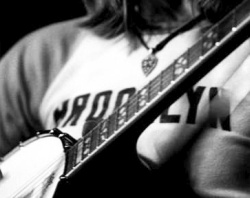 BB:
Tell me about your songwriting style. How would you describe it? BB:
Tell me about your songwriting style. How would you describe it?
...
RM: My style? I think itís kind of ďfloaty.Ē I was influenced by Joni
Mitchell. She just tapped me, into my emotive side. I thought, wow, you
can make that happen through music. And then thereís a more bluesy side to
me, which I learned a lot from Bonnie Raitt. Her style influenced my
voice; I consider her one of my voice teachers. But as for my style, I
donít feel like itís for me to say, really. I know I have a ďstyle,Ē but
thatís kind of a subjective thing. People sometimes tell me I remind them
of the most random people, like Edie Brickell or something. But I play
guitar and sing, so thatís my style.
BB: Any other musical influences?
...
RM: When I was young I listened to Bessie Smith. Ella Fitzgerald has
probably been an influence, but I donít know if youíd been able to tell.
Thereís just an emotive quality in her voice thatís always been really
attractive to me.
BB: What are your favorite
albums?
...
RM: David Grey, Sell, Sell, Sell. Ben Arnold, In Case Iím Gone Tomorrow.
And Meg Hutchinsonís new album, The Crossing.
RECORDING
BB: What has been your experience
recording music? What's the process?
...
RM: Well, Iíve kind of just gone for it, and Iíve done it pretty naively.
Iíve done it prematurely. Iíve done it before I was ready. Iíve recorded
songs that maybe werenít worth recording. So Iíve just documented most of
my songs, and Iíve been usually pretty lucky that there was someone there
to help me engineer it. For instance, my album Throwing Rocks. I did that
one while in Pittsburg. It was in a great studio with great mics, maybe
fifteen of them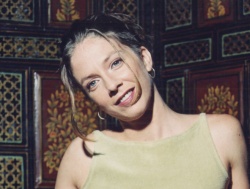 placed at various intervals around me. We captured the sound of the room,
and the guitar and the voice. So sonically it was a great album, but I
donít know that the songs were as fleshed out as they could be.
placed at various intervals around me. We captured the sound of the room,
and the guitar and the voice. So sonically it was a great album, but I
donít know that the songs were as fleshed out as they could be.
BB: Tell me about Eye On The
Horizon and Interim.
...
RM: I had been living in Pittsburg for four years, which is where I
recorded Throwing Rocks in í96, and then Eye On The Horizon in 2000. Those
two albums kind of book-ended my time there. Then I moved back to Boston
and started playing out, selling Eye On The Horizon. By 2002 I had written
a new group of songs, eight or nine songs that werenít on any albums.
People would come to my shows and tell me, ďYouíve got to put these songs
down somewhere,Ē or ask me where they could get copies of them. So it was
a natural documentation time. We wanted to record this the cheapest, the
best and raw. I had a couple tracks already that I had done with Brian
Webb: ďTime Will Tell,Ē and ďWill I.Ē So it was a bit haphazard, but I
knew that. My idea for calling it Interim was to hold these songs
someplace until I could give them a good home. I still think some of those
songs could be really be done right, given the chance.
BB: What do you do to try to get
your best stuff down when youíre recording?
...
RM: Just try to work with the best people. Because I donít know what Iím
doing in a studio. I can get the song out, and sing it well and perform it
well, but as far as recording I need people around me that know what
theyíre doing.
BB: Do you prefer the studio or
playing out?
...
RM: Playing out is instant gratification, so thatís the most fun. In
studio your perspective has to always be ďthe big picture.Ē You have to
have a clear vision of how the album is going to turn out. So when I do
make another album I hope to be clear on that part of it.
PLAYING OUT
BB: What makes a good show?
...
RM: People coming to it. I get excited, and it justifies me playing my
songs, and then itís fun. The audience is what makes a good show. Itís not
a show without the audience.
BB: What's your best show so far?
...
RM: My last one at Toad was pretty good. And a couple at Passim. I canít
think of just one. But sometimes the best show for me isnít the best show
for the audience, necessarily. Sometimes Iíll be having a great time, and
feel really great about it, but there arenít that many people there that
know my stuff. So the best shows are ones where the audience knows my
music, and Iím on.
BB: Have you ever opened for
anybody big?
...
RM: Oh, yeah, Iíve opened for some big people. David Grey in Pittsburg
when he was just starting out. Patti Griffin, she pretty much packed this
venue of 2000 people. Shawn Colvin. Michelle Shocked.
BB: Are any of your songs
featured anywhere?
...
RM: Two of my songs from Eye On The Horizon are in a movie called ďA
Wedding For Bella.Ē This was in Pittsburg. My boyfriend at the time was an
actor, and he was involved in theatre. He knew these people that were
making this movie, and they got to know my music, and this woman fell in
love with some of my songs and wanted them in the movie. I was actually in
the movie, too, briefly. Scott Baio was in it.
BB: Did you meet him?
...
RM: Yeah, I did. We had a little interaction. We were in the same scene,
and between filming people would just stand there for a while. He asked me
ďAre you good?Ē and I said yeah, and he said, ďSo play me something.Ē I
thought, ďAre you good? Act something.Ē Is that really reasonable?
THE BOSTON SCENE
BB: Whatís the music scene like
in Pittsburg as compared to Boston?
...
RM: The audience is
smaller, and somehow not as accessible, I think. Somehow art doesnít seem
as important there, so all the artists go to see each other. But the city
is spread out, so itís
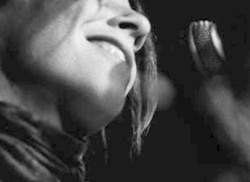 hard
to see everything. Here people go out to see a certain thing; either they
like Toad, or Passim or the Paradise. There arenít that many good venues
in Pittsburg, but people would pack to see someone like David Grey or
Patti Griffin. For the most part itís an ex-steel worker town. So itís
just a different vibe. Here the vibe is intellectual and cultured, and
there itís ďGo Steelers.Ē hard
to see everything. Here people go out to see a certain thing; either they
like Toad, or Passim or the Paradise. There arenít that many good venues
in Pittsburg, but people would pack to see someone like David Grey or
Patti Griffin. For the most part itís an ex-steel worker town. So itís
just a different vibe. Here the vibe is intellectual and cultured, and
there itís ďGo Steelers.Ē
BB: Why did you move to Pittsburg
originally?
...
RM: I had friends that were doing art there, and there was a really neat
theatre scene. I was floaty, and wanting to get out of this area and go
somewhere new, and I heard it was a burgeoning art scene. So I was just
kind of doing the Bohemian ďfollow by blissĒ thing. Pittsburg was such a
magical place, and it was small, which was lucky for me, because I was
able to make myself known early on.
BB: Tell me about your audience.
What are your fans like?
...
RM: People that would seek local music. People that donít have the
blinders on, people that are willing to think, and be philosophical.
People that donít need their music to be literal. Generally people in my
audience seem to be very appreciative, and much more emotional than I
expect anybody to be. Sometimes I think itís strange that I write a song
and itís this emotional expression, and then Iím going to go and get up on
a stage in front of everybody and sing it. Thatís a weird concept to me.
But people connect to it, which is endearing to me, and somewhat
surprising, too. But not so much anymore, because the more people come, the
more I feel itís useful. Itís a useful expression, and a positive thing.
Why I do it now, is that I feel like itís a positive outlet for them and
for my emotions, whatever in me has created the need to sing the song.
BB: Do you do any
interesting covers?
...
RM: I do a song by Sheryl Crow called ďHome.Ē I used to get compared with
her a lot, before I was ever listening to her. I also do a David Grey song
called ďSail Away.Ē I cover a Brian Webb song.
BB: What are your favorite places
to play?
...
RM: Toad. A place in Pittsburg called the Club Cafť. A place in Philly
called The Point. Around here, Somerville Theatre. And Passim. But itís
scary there. People are so intent, and sitting straight, and are watching
your every move. Bob Dylan has played there. I donít know, itís an
intimidating room.
BB: Who are your favorite people
to play with?
...
RM: Sean Staples. Heís played mandolin on Interim. And Plamen Jetchev, he
was the bass player. Brian Webb is still one of my favorite people to play
with.
BB: What are your favorite local
bands and artists?
...
RM: Meg Hutchinson. Is Tracy Chapman considered local? Sheís great.
THE FUTURE
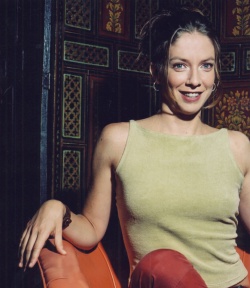
BB: If you could play on stage
with anyone alive, who would it be?
...
RM: I have to say David Grey. I do feel a connection with him, and I
expect I may play with him again. Iíd love to hear him sing harmonies on
one of my songs, or sing on one of his. Itíd be fun to just sing the hell
out of something with him. His philosophical approach to music is the
purest that Iíve found and most what I want to emulate. He writes to the
beat of his own drum, and I aspire to do that.
BB: If you could be in another
profession other than your own, what would it be?
...
RM: Iím studying to be a nurse, so I guess thatís the answer.
BB: What is your least favorite
idea for another profession?
...
RM: A janitor at a zoo. Or a brain surgeon. Itís takes far too much
concentration, and itís somebodyís brain. How do you cope with that
pressure?
BB: What do you hope to be doing
in music in a few years? What do you hope to have accomplished one year
from now?
...
RM: I hope to tour in Europe this summer, and play with some great people
over there. Beyond that, Iím considering spending some time in South
Africa.
BB: What do you hope people will
get out of your music?
...
RM: I want them to feel like they got their moneyís worth. And I want them
to feel as much as music can make someone feel. I want people to feel it,
through the words and the melody.
BB: What advice would you have
for aspiring local musicians?
...
RM: Find out what's authentic to you, musically. Learn your craft, learn
the notes, but do that to have the skills to express your own ideas. Donít
just do it to do it. And stay within yourself.

To learn more about Rachel McCartney, visit her website
at
http://www.rachelmccartney.com/
*Pictures courtesy of
http://www.rachelmccartney.com/
|